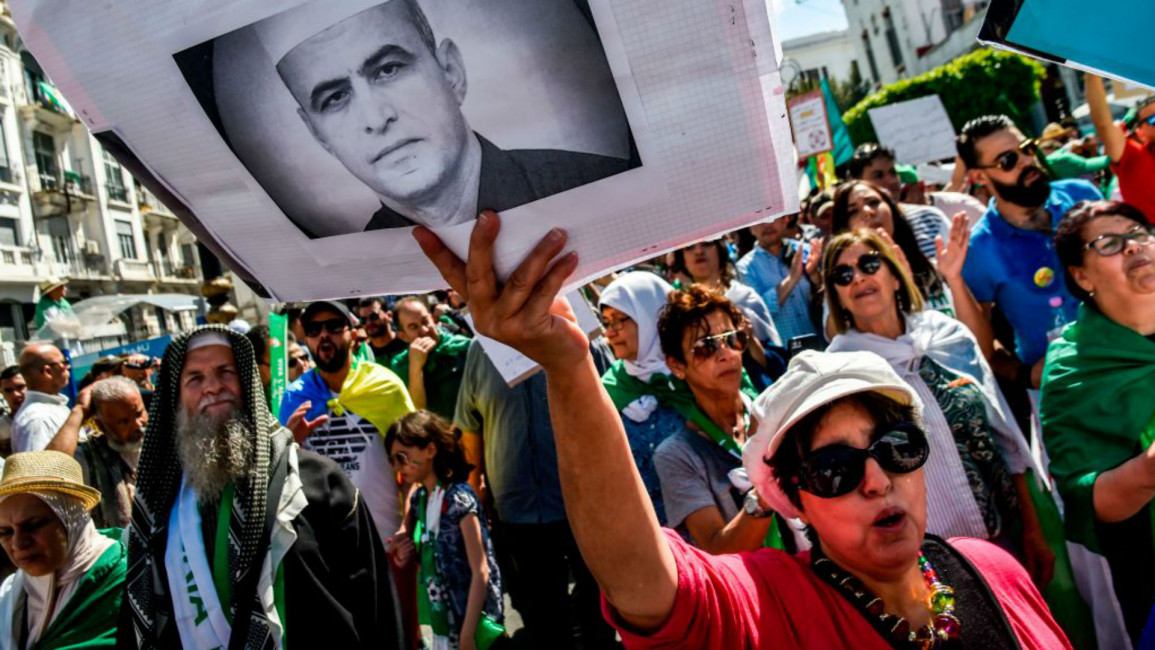
Death of an activist: A shame on Algeria's state
Earlier this week it was announced that Algerian human rights defender Kamel Eddine Fekhar had tragically died in detention. The news, which came as protestors prepared for the weekly Tuesday student protests, shocked many.
Doctor Fekhar was arrested on 31 March and thrown into Ghardaia prison for his ongoing outspoken support for the rights and freedoms of minorities - namely the Mozabite people.
The activist went on hunger strike to oppose his detention and the state's motivations for imprisoning him. He was accused of being a "threat to unity and integration", and even of inciting murder due to his renowned activism which sought to defend the cultural and political rights of the Amazigh - the non-Arab majority population of Algeria.
After over 50 days of hunger strike Fekhar had reached a critical state. A source close to him and his family stated that he had already fallen into a coma a few days prior to eventually being urgently transferred to a hospital in Blida. He died just a few hours after his arrival at Frantz Fanon hospital where he was to receive treatment.
Fekhar's lawyer, Mohamed Salah Dabouz took to Facebook to announce his death, and said that while the activist had been undergoing treatment in Ghardaia hospital, he had asked him to file an official complaint against the lack of adequate care.
 |
What has made the situation different is the confident and vocal nature of a population in the midst of a revolution |  |
Dabouz had also denounced his conditions in prison, stating that his prison cell resembled a landfill. The lawyer is pointing the finger at the Algerian authorities, for what he considers to be premeditated murder after continued targeting and harassment.
Kamel Eddine Fekhar, who was also an active member of the Socialist Forces Front (FFS), and had been subject to constant threats by the authorities, was arrested four years ago for his public denouncement of the repression meted out by the regime against Amazigh populations in the region of Ghardaia.
The FFS released a statement in light of Fekhar's death, which they say follows many weeks of "abusive and arbitrary detention under unbearable and inhumane conditions".
Twitter Post
|
"The FFS has never stopped denouncing and condemning these serious human rights violations, which demonstrate the dictatorial nature of the decision-makers in this country. The FFS demands justice and truth and that light is shed on the circumstances of this death."
"The FFS demands the immediate release of other political prisoners who are illegally and despicably languishing in these death jails and under the worst impediments to human dignity. The FFS demands that the real decision-makers in this country quickly take measures to appease the situation, including the immediate release of political prisoners, in order to prevent the country from sliding into potential chaos."
The Algerian league for human rights (Laddh) describe Fekhar as a political prisoner who had not committed any crime. The league also demanded an independent investigation into his death.
Sadly, Fekhar is not the first and if state authorities continue to behave this way, there are likely to be more victims.
British-Algerian journalist Mohamed Tamalt died in December 2016 when he too fell into a coma following a hunger strike.
The 42-year old Tamalt was accused of "defaming a public authority" when he published a poem about then President Abdelaziz Bouteflika on Facebook. He was sentenced to two years in prison.
The regime has, for a long time, been able to get away with such anti-democratic acts because of the sheer violence of its repression of Algerian society across the board. What has made the situation different this time around is the confident and vocal nature of a population in the midst of a revolution.
Within a few hours of hearing the horrendous news of Fekhar, journalists and protestors who were preparing to march for the 14th Tuesday in a row, took to social media and to the streets to express their anger.
 |
I would disagree, this shame is to be carried by the Algerian state and its institutions alone |  |
Demonstrators chanted "pouvoir assassin", accusing the regime of having assassinated him. Across different cities, from Algiers to Constantine, people held placards, cried and chanted in Fekhar's memory.
Thousands took to the streets in Bejaïa (Kablylia) to call for an urgent investigation into his death. Protests were even held in Paris and Madrid, honouring the activist as a martyr.
Fekhar's campaigning on behalf of the Amazigh people was labelled as divisive and anti-integrationist by those in power.
Read more: Algeria to probe death of prominent activist in prison
For a long time, the Algerian state would marginalise such activists and outspoken people by branding them separatists, often with the insinuation that they were also atheists who hated Arabs, and were agents of the West.
This practice, which stems from the divide and conquer methods of French colonial rule, is something that protestors are acutely aware of.
According to demonstrators in some of Algeria's largest cities, seeing the Amazigh flag at protests and placards that explicitly address the diversity of ethnic groups in Algeria which recognise the repression of the Amazigh people is refreshing, important, and shows hope for the possibility of building a new Algeria for all.
Amnesty International also condemned Fekhar's death and called it a shame on the country.
 |
Fekhar died as one more victim of this sordid game |  |
I would disagree, this shame is to be carried by the Algerian state and its institutions alone; Algeria's powerful, state officials and military generals, who have pitted Algerians against one another for so long - those living inside the country against the diaspora, the Arabs against the Amazigh, the religious against the atheists.
For their part, the people are honouring Fekhar, and all political prisoners through the protests which have erupted since the end of February.
They seek justice for him and all those who have sacrificed themselves for freedom and that is a source of pride for the country.
Fekhar died as one more victim of this sordid game, but the Algerian people fight, day in day out, so that he may be the last. All power to them.
Malia Bouattia is an activist, a former president of the National Union of Students, and co-founder of the Students not Suspects/Educators not Informants Network.
Follow her on Twitter: @MaliaBouattia
Opinions expressed in this article remain those of the author and do not necessarily represent those of The New Arab, its editorial board or staff.



